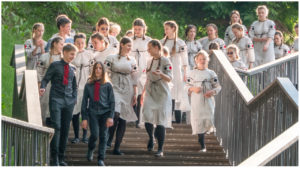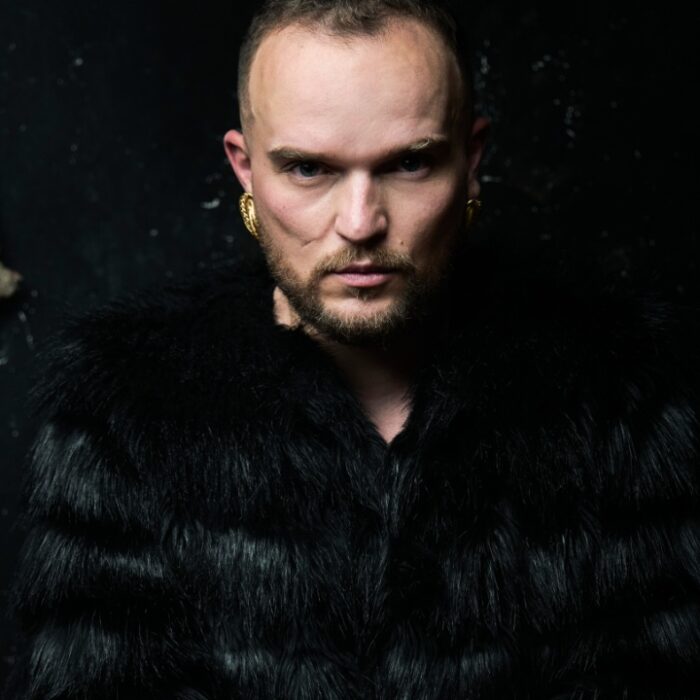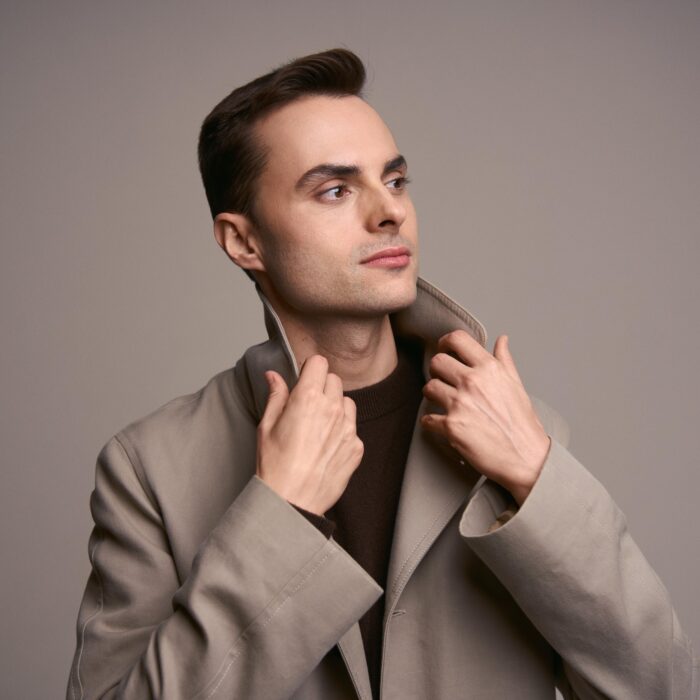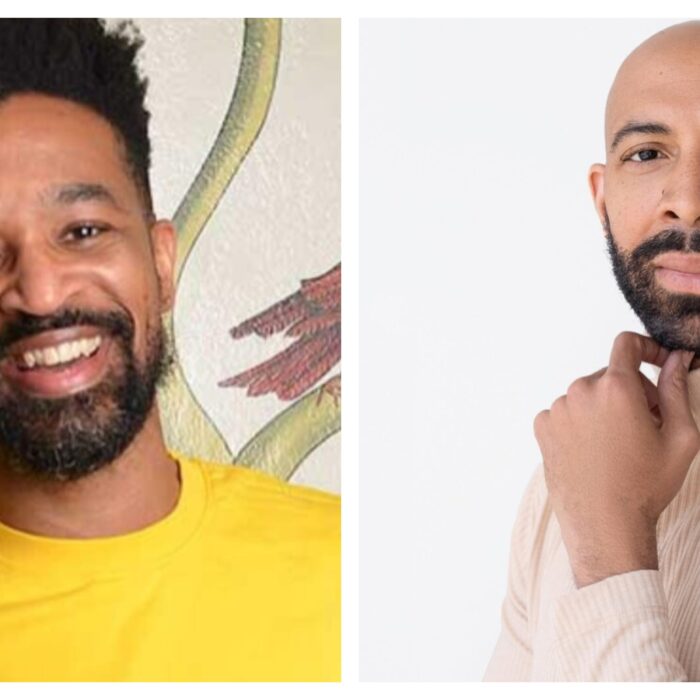
Q & A: Ukrainian Organizations on ‘Notes from Ukraine: 100 Years of Carol of the Bells’ Concert
By Logan MartellOn December 4, 2022, Carnegie Hall will host a celebration of Ukrainian culture titled “Notes From Ukraine: 100 Years of ‘Carol of the Bells.’”
The concert marks the centennial anniversary of the American premiere of Mykola Leontovych’s “Shchedryk.” The English adaptation known as “Carol of the Bells” has gone on to become an iconic Christmas song. It premiered at Carnegie Hall on October 5, 1922, as part of a Ukrainian cultural diplomacy project, performed on a world tour by the Ukrainian Republic Capella Choir under Oleksandr Koshyts, and racking up 200 performances in America alone.
The centennial concert is co-presented by The Ukrainian Institute of Kyiv, the Ministry of Foreign Affairs of Ukraine, Razom for Ukraine, and the Ukrainian Contemporary Music Festival, with proceeds going towards President Zelensky’s United24 Initiative to help rebuild the country. In addition to “Shchedryk,” the program features works by Ukrainian-American composers and the world premiere of a work by Trevor Weston, which sets the poetry of Ukrainian Nobel Prize-nominated poet Serhiy Zhadan to music. Featured performers include soprano Janai Brugger and Toronto-Based Ukrainian folk singer Marichka Marczyk, The Choir of Trinity Wall Street, Ukrainian Children’s Choir Shchedryk, Ukrainian Chorus Dumka of New York, and Ukrainian Bandurist Chorus.
OperaWire had the chance to speak with the following representatives: Vasyl Hrechynsky, Director of the Ukrainian Chorus Dumka of New York; Leah Batstone, Artistic Director of the Ukrainian Contemporary Music Festival; Tetyana Filevska, Creative Director of Ukrainian Institute Kyiv; and Dora Chomiak, President of Razom for Ukraine. We thank them for their time and acknowledge the efforts of the Children’s Chorus Shchedryk, with whom the organizers have lost contact because of the country’s electricity loss.
OperaWire: Western audiences know “Shchedryk” as its Christmas carol adaptation, “Carol of the Bells.” Can you tell us a little about how the song is perceived culturally in Ukraine? Is there any personal significance you’d like to share?
Vasyl Hrechynsky: Shchedryk belongs to the early examples of Ukrainian folklore, which go back to pagan times. Shchedryk comes from the word “shchedryy,” which means generous, and was traditionally sung on New Year’s Eve or Shchedryy Vechir by children who went from home to home wishing everyone a prosperous New Year. In 1916, in Kyiv, the Ukrainian choral conductor Oleksandr Koshyts with his St. Volodymyr University Student Choir, premiered “Shchedryk.’ an entirely new work using the four-note melody with the original folk lyrics. This “Shchedryk” was created for a choir by the Ukrainian composer and choral conductor, Mykola Leontovych. Since then, “Shchedryk” has taken on a ‘new life,’ spreading from the villages to the cities to the international stages. Due to its popularity, Shchedryk became the most recognized Ukrainian song in Europe, being referred to as the Ukrainian ‘national code.’ Shchedryk gained further popularity when Peter Wilhousky wrote new lyrics to Leontovych’s arrangement. He adapted the Ukrainian melody to the English-speaking world. For over a hundred years, this simple Ukrainian melody called “Shchedryk” or “Carol of the Bells” continues to wish people good fortune.
Leah Batstone: It is a popular and well-known New Year’s song, or shchedrivka, in Ukraine. The original version is widely recorded and performed by choirs, and many pop stars have released their own versions of “Shchedryk.” One of my favorites has to be that of Ukrainian rapper Lil Klef, who combines Ukrainian and English lyrics with his own. The Americanization of the melody can be a bit of a sore spot! I have been told several stories in which Ukrainians have tried to explain the song’s origins to foreigners only to be dismissed, an experience I can corroborate from my own conversations. For me personally, “Carol of the Bells” has been my family’s favorite carol since long before I knew its Ukrainian origins.
Tetyana Filevska: I remember this song from my early childhood. It was part of the Christmas mood. But I think I was lucky to be of a background that was rooted in Ukrainian culture, unlike many other Ukrainians who suffered from Russification throughout the 20th century and knew little or nothing about Ukrainian culture. I think for many people, it was a total surprise to learn that a famous “Home Alone” tune was from Ukraine. But I think this is changed now, and even little kids know the Ukrainian rhymes of Shchedryk. Or at least my three-and-a-half-year-old daughter always asks to turn on a song about a swallow and sings it endlessly. And thanks to a lot of research and promotion by Tina Peresunko and Leontovych Institute in recent years about the history of the song and a famous world tour of Koshyts choir, it is now perceived as one of the important symbols of Ukrainian history and culture. A song of an ancient origin reinvented by composer Mykola Leontovych became the international anthem of Christmas.
Dora Chomiak: Personally, the song has always been part of the holidays for me. I was born and grew up in the United States in a house with my parents and grandparents where we spoke Ukrainian. I was not granted a visa to meet my family in Ukraine until I was halfway through college. It was still inside the Soviet Union, on the other side of the Iron Curtain. Shortly after Ukrainians voted in a referendum for independence, I had the privilege of celebrating Christmas in Ukraine with my grandmother on her first visit since she fled during WWII to escape the bombing. On Christmas Eve, she sat next to her sister, who she had not seen for 50 years. Her sister had been sent to Siberia by the Moscow regime that drove the Ukrainian Catholic Church into the underground. Their father had been a priest and was deported.
OW: When this song toured a century ago, it did so as a statement of identity for Ukrainian culture and against Russian hostility. What are your thoughts on this performance coming in a time of such similar circumstances?
VH: A century ago, Russia was determined to eliminate Ukraine, its culture, and its history. History is repeating itself because Russia can’t come to terms with the fact that Ukraine is an independent and prosperous nation and that its people and culture have endured. One of the goals of Russia’s war on Ukraine is to perform a deculturalization. They are targeting centers of culture and, to date, have destroyed over 300 museums, educational institutions, places of worship, and historic sites, basically trying to annihilate Ukraine, its history, and its culture.
Celebrating the 100th anniversary of Shchedryk’s performance at Carnegie Hall shows the immortality of the Ukrainian culture and how determined and resilient the Ukrainian people are. Ukrainians love their country and freedom and will fight for them.
LB: The parallels are stunning. When I began working on this project in April 2020, the tone around the concert’s goals was very different. Then, our focus was to share and highlight cross-cultural connections between Ukraine and the United States of America through a joyous celebration of America’s favorite holiday carol. Since February, however, the concert has taken on new dimensions in light of the repetition of history, of Ukraine’s ongoing struggle for sovereignty, and attempts by Russia to destroy Ukrainian culture. In addition to our previous goals, we now seek to emphasize the threat under which Ukraine and its music find themselves once more and to indicate the truly important role that music and culture can play not only in shared history but also in encouraging solidarity. What I have tried to do in programming this concert is to mirror the goals of the original tour—to share Ukraine’s unique choral tradition and its exciting contemporary choral compositions—as well as to reveal the reflexive influences Ukrainian music and American music and culture have had on one another.
TF: It was hard to imagine two years ago, when the very idea of such a concert emerged in different circles in Ukraine and among diasporas, that conditions around the concert would be so similar to the historical context of the original Carnegie concert of the Koshyts Choir. When Petliura, who was back then the head of the newly established Ukrainian National Republic, sent the choir, he understood Ukraine needed a voice that would be heard by the international community. Ukraine needed support to stand in the shaky circumstances, and music was the way to tell about the country and its culture and call for support. As it was in 1922, this year, Russians invaded our country again. Both times they came with brutality and violence against our people and culture, killing civilians and destroying and looting cultural heritage. As it was 100 years ago, we need help to stand against the occupying power and protect our lives and our future. Again, the choir from Ukraine comes at the time of war to sing about the beautiful country and its fight for its own existence. We hope the world will hear our call this time and will support us in our struggle.
DC: This performance is immensely personal for me. My grandfather fought this same war 100 years ago. He put down his lawyer’s pen and put on a uniform, and picked up a firearm. It’s the same war now, except I have two things he did not have. Today, men and women in Ukraine are putting their bodies in harm’s way to defend the sovereignty of the country and the principles of the rule of law for the free world. I am privileged to live in the United States, where I contribute in a different way by working to unlock the potential of Ukraine to contribute to the global community. The other difference is that now the world hears directly from people in Ukraine. For me, this is my motivation for being the president of the non-profit organization Razom for Ukraine. The word ‘razom’ means ‘together’ in Ukrainian. Since 2014, we have been collaborating with organizations and individuals around the world to build a more prosperous Ukraine. This project, years in the making, is an example of working ‘razom.’
OW: How has the war in Ukraine affected the organizing of this concert?
VH: The entire world knows the difficulties that Ukraine is currently facing due to the war. The news outlets, social media, etc., cover the hardships and atrocities that the Ukrainian people are experiencing; bombed residential buildings, schools, churches, and hospitals; no electricity due to damaged power grids, low or non-existent water supplies, and the list goes on.
LB: Ukrainians are facing all kinds of difficulties at this time. Since October 10, when Russia stepped up its attacks on Ukrainian cities and civilian infrastructure, many Ukrainians go for large parts of their days without light, heating, or internet connections. This has, of course, meant that there had been inevitable delays of materials and occasions when we have not been able to connect with Ukrainian partners during regularly scheduled meetings. The biggest issue has been travel for Ukrainians. Members of the Children’s Choir Shchedryk of Kyiv have been scattered throughout Ukraine and Europe and have had to apply for their visas in Poland as the American embassy in Ukraine is closed, and those traveling to Poland from Ukraine have spent more than 24 hours in transit by bus. It has taken a truly heroic effort on the part of our Ukrainian partners and the choir members to make this concert happen.
TF: Ukrainians live in a situation where 100 rockets hit all around the country in a day. They spend hours in bomb shelters, lacking electricity, heat, water, and connection. There are blackouts all around the country. It is not safe anywhere. As we know, it is no longer even in Poland, which is a NATO country. Russia’s aggression doesn’t know any limits. Ukrainians live in the fear of nuclear attack or catastrophe in the occupied Zaporizhzhia power plant. Ukrainians go through traumas that come back every day of the war with a new challenge to keep up another day. And these are the same people that can collect $17 million in donations to buy a satellite for the needs of the army; they continue to study in schools and universities and perform a five-hour-long contemporary opera in an empty museum. Ukrainians are amazing people, and they can do the impossible. It is a challenge to bring 55 kids from Ukraine and Europe to New York and arrange visas and logistics. It is a challenge in peaceful times; I have to admit. But war made it all even ten times more difficult. And the first rehearsals were held in bomb shelters in Kyiv during the shellings.
DC: The assault on Ukraine has brought logistical obstacles, increased costs, and heightened urgency to the implementation of this project. Power outages, lack of heat, and intermittent shelling are making planning difficult for our global team. Many of our partners in Ukraine are scattered around the globe or working throughout Ukraine where increased attacks on civilian infrastructure are making it hard to get access to the internet and basic necessities like heat and water. Our expense budget had to increase so that we could overcome many unforeseen obstacles and challenges to bringing artists from Ukraine to the Carnegie stage.
When our team started to engage corporations to provide financial support for this project (in early 2022), we were simultaneously raising funds and delivering critical medical supplies and life-saving aid to Ukraine to stop literally the bleeding of civilians and first responders. So we had to prioritize. We originally wanted to engage the multitude of corporations that have used the famed music of Carol of the Bells in their ad campaigns through the decades. However, we do plan to approach them for support of the concert in other formats eventually, such as online video. For a time, we had to put this entire project on the back burner so we could focus on saving lives. Once we realized we simply had to go forth with the production because the world needed to experience the resilience and determination of Ukraine and had to experience the long and historic interplay between American and Ukrainian culture, we had to work all that much faster and harder to raise the funds. We are still doing it. And will continue to do so. But we do so knowing that together, razom, Ukrainians can make the impossible possible. We are immensely grateful to everyone who has stepped up to support this concert in many ways, from buying tickets, to making donations online, to telling their friends about the important history and significance of this production.
OW: Much of the classical music world was shocked by the recent murder of Ukrainian conductor Yuriy Kerpatenko at the hands of Russian forces for refusing to participate in a concert. Is there any statement you’d like to make about this tragic loss?
VH: The heroic and tragic passing of Conductor Yuriy Kerpatenko is a great loss to Ukraine and the world. It’s not enough that Russia is destroying Ukraine’s cultural heritage, but they are also performing a cultural “genocide.” His death symbolizes Russia’s complete disregard for human life and shows the indomitable spirit of the Ukrainian people.
LB: This is simply an absolute horror, and it must be included in the long list of war crimes Russia has committed against Ukraine. It goes to emphasize, however, that the performance of music is always political and that those who take the stage are never doing so separate from the political environments in which they live and work. This reality and this tragedy are evidence in direct opposition to claims to be apolitical made by Russian artists and statements made by musical institutions around the world seeking to skirt the discussion of banning Russian art and artists since February 24.
TF: It is shocking that a conductor was killed in the middle of Europe. His name was Yuriy Kerpatenko. It is shocking that a film director was killed on October 13 in the middle of Europe. His name was Mantas Kvedaravicius. He was from Lithuania and was killed on April 3. It is shocking that an actor was killed in the middle of Europe. His name was Pasha Lee. He was killed on March 6. There are dozens of Ukrainian artists and cultural workers who have been killed in the past eight years since Russia started a war against Ukraine. We have to know each name. Hundreds of people that used to work in culture became soldiers and volunteers because that was the only choice they were given. We know that many won’t return. We are the price. In Ukraine’s history, we already went through the tragic loss of the whole generation of cultural community. In the 1930s, Russians executed hundreds of artists, cultural workers, and thinkers. They shot two people with one bullet, saving bullets that were more precious for Russians than the lives of people. We know it as the Executed Renaissance. And we all have to do everything to prevent losing the whole generation again. If Ukraine gets all the needed weapons, we can stop with war sooner and save more lives.
DC: My colleagues have written very eloquently about this point. I have nothing to add.
OW: To Vasyl Hrechynsky: Tell us about your experience with the Ukrainian Chorus Dumka on SNL, how would you describe the Western reception shown to recent efforts to raise awareness for Ukraine?
VH: The Ukrainian Chorus Dumka’s performance on SNL was important since it came days after Russia’s unprovoked invasion of Ukraine. Dumka performed “Prayer for Ukraine” because I felt that this was the only appropriate song for the moment. It was sung in Ukrainian, but everyone understood the strong emotional message asking the world to support and pray for Ukraine and her people. It is extraordinary how the world has shown great support for Ukraine’s cause over the past 9 months since the war began. Countries have offered humanitarian assistance to the Ukrainian people. Many countries have welcomed Ukrainian refugees, saving the lives of millions of Ukrainians and giving them hope that they will one day return to Ukraine.
Categories
Interviews


